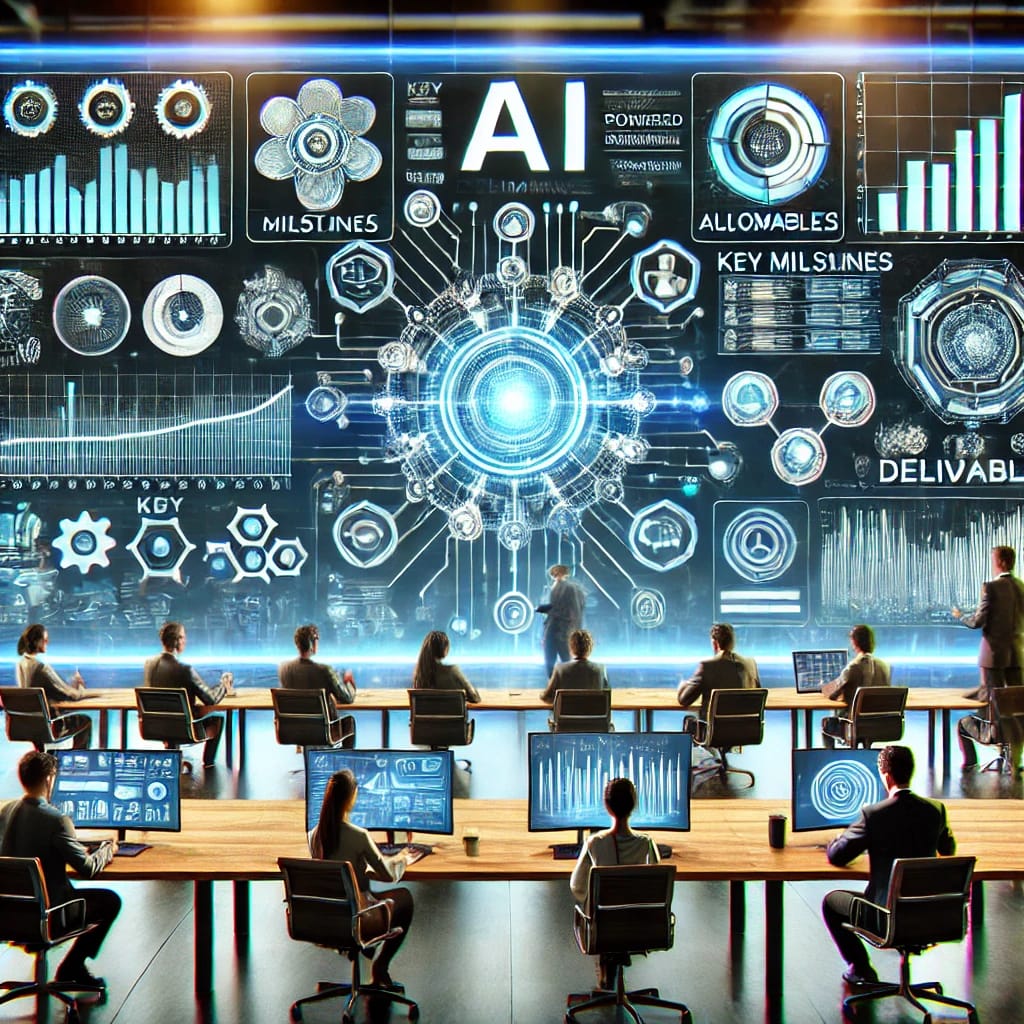How to Track Project Milestones and Deliverables with AI-Driven Tools: A Comprehensive Guide
Introduction to AI-Driven Project Management
Project management has always been a field ripe for innovation, and the integration of artificial intelligence (AI) is the latest trend reshaping how projects are managed across various industries. AI in project management refers to using AI-driven tools and technologies to plan, execute, monitor, and successfully close projects more efficiently and effectively. The goal is to reduce the manual effort involved in managing projects and improve outcomes by leveraging the predictive and analytical capabilities of AI.
What Are Project Milestones and Deliverables?
Project milestones and deliverables are essential elements of project management. Milestones are significant points in the project lifecycle that mark the completion of major phases or tasks. These are checkpoints that help in tracking the progress of the project. Examples of milestones include the completion of a project charter, the end of a development iteration, or the approval of design documents.
Deliverables, on the other hand, are tangible or intangible outputs produced as a result of project activities. Deliverables can be reports, software modules, products, or any other results that the project aims to achieve. For instance, in a software project, deliverables might include a prototype, the final software application, or user manuals.
Importance of Tracking Project Milestones and Deliverables
Tracking project milestones and deliverables is crucial for several reasons:
- Visibility and Transparency: It provides a clear view of the project’s progress, allowing stakeholders to stay informed and aligned with the project’s goals.
- Accountability: By defining and tracking milestones and deliverables, teams can hold themselves accountable for meeting deadlines and quality standards.
- Risk Management: Early identification of delays or deviations from the plan allows for timely corrective actions, mitigating risks before they escalate.
- Resource Management: Ensures optimal allocation and utilization of resources, preventing wastage and bottlenecks.
- Client Satisfaction: Keeping track of deliverables ensures that clients receive what they expect, when they expect it, thereby enhancing their satisfaction.
How AI Transforms Project Management
AI transforms project management in several ways:
- Data Analysis and Insights: AI tools can analyze historical data to provide insights and forecasts, allowing project managers to make informed decisions.
- Automation: Routine tasks such as scheduling, status updates, and reporting can be automated, freeing up project managers to focus on more strategic activities.
- Predictive Analytics: AI can predict potential delays and resource shortages, helping teams to plan proactively and avoid issues.
- Enhanced Collaboration: AI-driven project management tools can facilitate better communication and collaboration among team members, especially in remote or distributed teams.
- Real-Time Monitoring: AI can continuously monitor project progress and provide real-time alerts to ensure projects stay on track.
Choosing the Right AI-Driven Tools
Choosing the right AI-driven project management tools is pivotal to the successful implementation of AI in your projects. Here's what you need to consider:
Key Features to Look for in AI-Driven Tools
When evaluating AI-driven project management tools, look for the following features:
- Automation Capabilities: The tool should automate mundane tasks such as scheduling, reminders, and reporting.
- Predictive Analytics: It should provide insights based on historical data to forecast project timelines, resource needs, and potential risks.
- Integration: Ensure the tool can seamlessly integrate with your existing systems and applications.
- User-Friendly Interface: A good tool should be easy to use and navigate, without requiring extensive training.
- Collaboration Tools: Look for features that promote collaboration, such as chat, document sharing, and task assignments.
- Customizability: The tool should be adaptable to meet the unique needs of different projects and teams.
- Security: Ensure the tool has robust security features to protect your project data.
Popular AI-Driven Project Management Tools
Some of the popular AI-driven project management tools include:
- Scrumbuiss: An AI-powered project management software that offers comprehensive project creation, task management, progress tracking, and detailed analytics.
- Monday.com: This tool provides automation, customizable workflows, and integration with various apps.
- Wrike: Known for its robust task management, Wrike also offers AI-powered features like timesheet tracking and project risk predictions.
- ClickUp: A versatile tool that combines tasks, documents, goals, and inboxes into one app, with strong AI components.
- Smartsheet: Offers automation and AI capabilities for data collection, visualization, and workflow management.
Comparing Different AI Solutions
When comparing different AI solutions, consider factors such as:
- Cost: Evaluate the subscription plans and pricing structures to ensure they fit within your budget.
- Scalability: The tool should be able to grow with your business and handle larger projects or teams over time.
- Integration Capabilities: Assess how well the tool integrates with other software tools you use, like CRM systems, email, and other project management tools.
- Features vs. Needs: Match the tool’s features with your specific project requirements and workflows.
- User Feedback: Look at user reviews and testimonials to gauge the tool’s reliability and performance.
Setting Up AI-Driven Tools for Tracking
Once you've chosen the right tool, proper setup and integration are crucial to harnessing its full potential.
Initial Setup and Integration with Existing Systems
Begin by installing the tool and setting it up. Follow these steps:
- Integration: Connect the AI tool with your existing systems such as email, task management software, and communication tools.
- Data Import: Import your project data into the tool. This might include project plans, tasks, timelines, and team information.
- Set Up Project Templates: Use or create templates that fit your project type to streamline setup for future projects.
Customizing the Tool for Your Project Needs
Customization is key to making an AI-driven tool work for your specific requirements:
- Configure Dashboards: Set up custom dashboards to display critical project metrics and KPIs.
- Create Custom Workflows: Adapt workflows to match your project’s processes, ensuring the tool’s automation fits seamlessly with your operations.
- Set Up Notifications and Alerts: Configure how and when the tool sends notifications to keep everyone informed about important updates and changes.
Training Your Team to Use AI Tools
Ensure that your team is well-prepared to use the new tool:
- Provide Training: Organize training sessions or tutorials to help your team understand the tool’s features and functionalities.
- Create User Guides: Develop easy-to-follow guides and documentation for reference.
- Encourage Exploration: Allow your team to experiment with the tool to become familiar with its capabilities and potential uses.
Optimizing Project Milestone Tracking
AI-driven tools can significantly enhance the tracking of project milestones.
Automating Milestone Detection and Alerts
AI tools can automatically detect when milestones are reached and send alerts to keep everyone informed:
- Automated Updates: Set the tool to update milestone statuses based on task completion.
- Real-Time Alerts: Configure alerts to notify team members and stakeholders about upcoming or overdue milestones.
Using Predictive Analytics for Milestone Management
Leverage AI's predictive analytics to manage milestones more effectively:
- Forecasting Delays: Use AI to predict potential delays in reaching milestones based on current progress and historical data.
- Resource Adjustment: Adjust resource allocation in response to predictive analytics to ensure milestones are met on time.
Real-Time Monitoring and Reporting
Real-time monitoring and reporting are powerful features of AI-driven tools:
- Live Dashboards: Set up live dashboards to monitor progress in real-time.
- Automated Reports: Generate automated reports on project status, highlighting the progress of milestones and any issues encountered.
Ensuring Accurate Deliverable Tracking
Accurate tracking of deliverables ensures project success and client satisfaction.
Automating Deliverable Status Updates
AI-driven tools can keep deliverable status updated without manual intervention:
- Auto-Progress Updates: Configurations to update the status of deliverables based on task completion automatically.
- Client Notifications: Set up the tool to automatically notify clients when deliverables are completed or delayed.
Using AI for Resource and Time Allocation
Efficiently manage resources and time with AI:
- Resource Allocation: AI can suggest optimal resource allocation based on project requirements and team availability.
- Time Tracking: Utilize the AI tool for automated time tracking, ensuring accurate logging of hours spent on tasks and deliverables.
Managing Dependencies and Risks with AI Insights
Utilize AI to manage project dependencies and risks effectively:
- Dependency Tracking: Visualize and manage task dependencies to ensure smooth project flow.
- Risk Identification: AI-driven tools can identify potential risks early, allowing for timely mitigation strategies.
Case Studies and Real-World Applications
AI-driven project management tools have yielded impressive results in diverse real-world scenarios.
Successful Implementation in Large Enterprises
Many large enterprises have successfully implemented AI in their project management processes:
- Tech Giants: Companies like Google and Microsoft have adopted AI-driven project management tools to streamline their complex projects.
- Multinational Corporations: Firms such as IBM and Deloitte leverage AI to manage their extensive project portfolios efficiently.
Benefits Achieved and Lessons Learned
The implementation of AI-driven tools has provided numerous benefits and valuable lessons:
- Increased Efficiency: Automation of routine tasks has significantly reduced manual workload, boosting overall productivity.
- Improved Accuracy: Predictive analytics and real-time monitoring have enhanced the accuracy of project tracking and reporting.
- Enhanced Team Collaboration: AI-driven tools have improved communication and collaboration among remote and distributed teams.
- Lessons: The key lessons include the need for proper training, the importance of customization, and the benefits of continuous monitoring and feedback.
Potential Challenges and How to Overcome Them
While AI-driven project management offers many advantages, it also presents challenges:
- Integration Issues: Integrating with existing systems can be complex. Overcome this by thorough planning and utilizing support from the tool provider.
- User Resistance: Teams may be resistant to change. Address this by involving them in the selection process and providing ample training.
- Data Security: Ensuring data security is paramount. Choose tools with robust security measures and comply with data protection regulations.
Future Trends in AI-Driven Project Management
The field of project management is continually evolving, with several future trends emerging.
The Evolution of AI in Project Management
AI in project management continues to evolve:
- Advanced Algorithms: Development of more sophisticated algorithms to improve predictive analytics and decision-making.
- Integration with Other Technologies: Increased integration with IoT, blockchain, and other emerging technologies for enhanced project management.
Emerging Technologies to Watch
Several emerging technologies are poised to impact AI-driven project management:
- Machine Learning: More advanced machine learning models will provide better insights and automation capabilities.
- Natural Language Processing (NLP): Enhanced NLP will improve communication and interaction with AI tools.
- Augmented Reality (AR): AR could provide new ways to visualize project progress and data.
Preparing Your Organization for Future AI Developments
Organizations should prepare for future AI developments:
- Continual Learning: Encourage a culture of continual learning and adaptation to new technologies.
- Invest in Training: Regularly train your team on new features and capabilities of AI-driven tools.
- Stay Informed: Keep abreast of the latest trends and advancements in AI to leverage new opportunities.
In conclusion, AI-driven project management is a game-changer for modern project management. Tools like Scrumbuiss provide powerful features to streamline workflows, enhance productivity, and ensure project success. Whether you are a project manager, small business owner, or part of a corporate team, integrating AI into your project management processes can provide significant benefits.
Discover how Scrumbuiss can transform your project management experience by visiting our website and starting your journey towards more efficient and effective project management today.
About the author

Penify creator, Fullstack developer, Typescript, Web, Apps, Blogger
I am an experienced Fullstack web developer and the creator of Penify blog platform. I am excited and motivated to explore new technologies. I am a dedicated and hardworking person with a will to create the best user experience.
